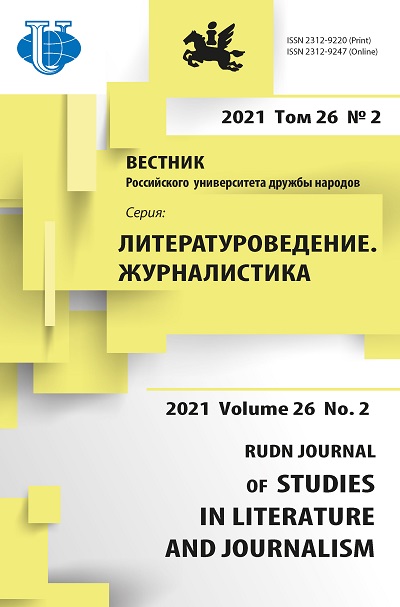Цифровые компетенции и технологии новой искренности в эпоху Web 4.0
- Авторы: Фортунатов А.Н.1, Воскресенская Н.Г.1
-
Учреждения:
- Национальный исследовательский Нижегородский государственный университет имени Н.И. Лобачевского
- Выпуск: Том 26, № 2 (2021)
- Страницы: 276-285
- Раздел: Журналистика
- URL: https://journals.rudn.ru/literary-criticism/article/view/26943
- DOI: https://doi.org/10.22363/2312-9220-2021-26-2-276-285
- ID: 26943
Цитировать
Аннотация
Исследуется проблема социальной агрессии молодых людей, погруженных в цифровую коммуникацию. Этическая сфера в цифровой коммуникации находится в удручающем состоянии, в связи с чем ставится задача выяснить глубинные причины социального антагонизма и конфликтности. Одной из важнейших причин социальной деструкции является отсутствие четких пространственно-временных координат для виртуального субъекта, что приводит к эксплуатации самими технологиями пассивной личности. Человек превращается в материал для алгоритмов, и его психофизика становится продолжением обезличенной технологии. Такая ситуация характеризует формирование эпохи Web 4.0, которую можно назвать «контркоммуникацией». Интерактивность уходит в прошлое. Ей на место приходят технологии «новой искренности». Эпатажность, детабуизация, эксплуатация эротики - это формы коммуникативного использования виртуального субъекта, находящегося в современном коммуникативном пространстве в состоянии неослабевающего напряжения, которое лишь меняет свой модус в связи со все новыми поводами для экзальтации. Подтверждением того, что виртуальная этика все дальше уходит от «традиционных» этических принципов, стало исследование психики молодых людей, полностью погруженных в виртуальный мир. Их социальные навыки, а также социальная защищенность оказались самыми низкими из различных групп молодежи. Коммуникация для них в итоге превращается в настойчивый поиск развлечений, стремление к гедонистически-комфортной среде, отрицание социально значимых тем и проблем.
Ключевые слова
Об авторах
Антон Николаевич Фортунатов
Национальный исследовательский Нижегородский государственный университет имени Н.И. Лобачевского
Автор, ответственный за переписку.
Email: anfort1@yandex.ru
доктор философских наук, профессор, заведующий, кафедра социально-политических коммуникаций, Институт международных отношений и мировой истории
Российская Федерация, 603022, Нижний Новгород, пр-кт Гагарина, д. 23Наталья Геннадьевна Воскресенская
Национальный исследовательский Нижегородский государственный университет имени Н.И. Лобачевского
Email: anfort1@yandex.ru
кандидат психологических наук, доцент, кафедра социально-политических коммуникаций, Институт международных отношений и мировой истории
Российская Федерация, 603022, Нижний Новгород, пр-кт Гагарина, д. 23Список литературы
- Иванова Т.В. Интернет-зависимость как проблема современного общества // Интеллектуальный потенциал XXI века: ступени познания. 2014. № 24. С. 49-53.
- Зверянская Л.П. Интернет-зависимость как основная причина развития киберпреступности // Фундаментальные и прикладные исследования: проблемы и результаты. 2015. № 17. С. 239-243.
- Algavi L. et al. From The Silent House meme to The Blue Whale-Game: the storyworld’s transformation // SGEM2017 Conference Proceedings (24-30 August 2017), Vol. 1. Book 4. Pp. 253-260. http://dx.doi.org/10.5593/sgemsocial2017/41/S16.032
- Шпитцер М. Антимозг: цифровые технологии и мозг. М.: АСТ, 2014. 288 с.
- Серегина А.А. Инфантилизм личности как фактор девиантного поведения // Социальная политика и социология. 2011. № 7. С. 283-288.
- Сидорова А.М. Философское понимание причин инфантилизма современной молодежи // Совет ректоров. 2011. № 1. С. 61-66.
- Гаврилова Е.А. Проблемы компьютерной этики и этики киберпространства // Вестник Российского экономического университета имени Г.В. Плеханова. 2020. Т. 10. № 1 (29). С. 143-148.
- Бодрийяр Ж. В тени молчаливого большинства, или Конец социального. Екатеринбург: УрГУ, 2000. 96 с.
- Чепьюк О.Р. Экономическая бессубъектность как фактор дегуманизации социальных отношений: дис. … д-ра филос. наук. Н. Новгород: Университет Лобачевского, 2021.
- Карпова А., Новокшенов К. 30 самых влиятельных лиц киберспорта. Рейтинг Forbes и Sports.ru // Forbes. 2020, 5 октября. URL: https://www.forbes.ru/rating/410467-30-samyh-vliyatelnyh-lic-kibersporta-reyting-forbes-i-sportsru (дата обращения: 13.09.2020).
Дополнительные файлы















